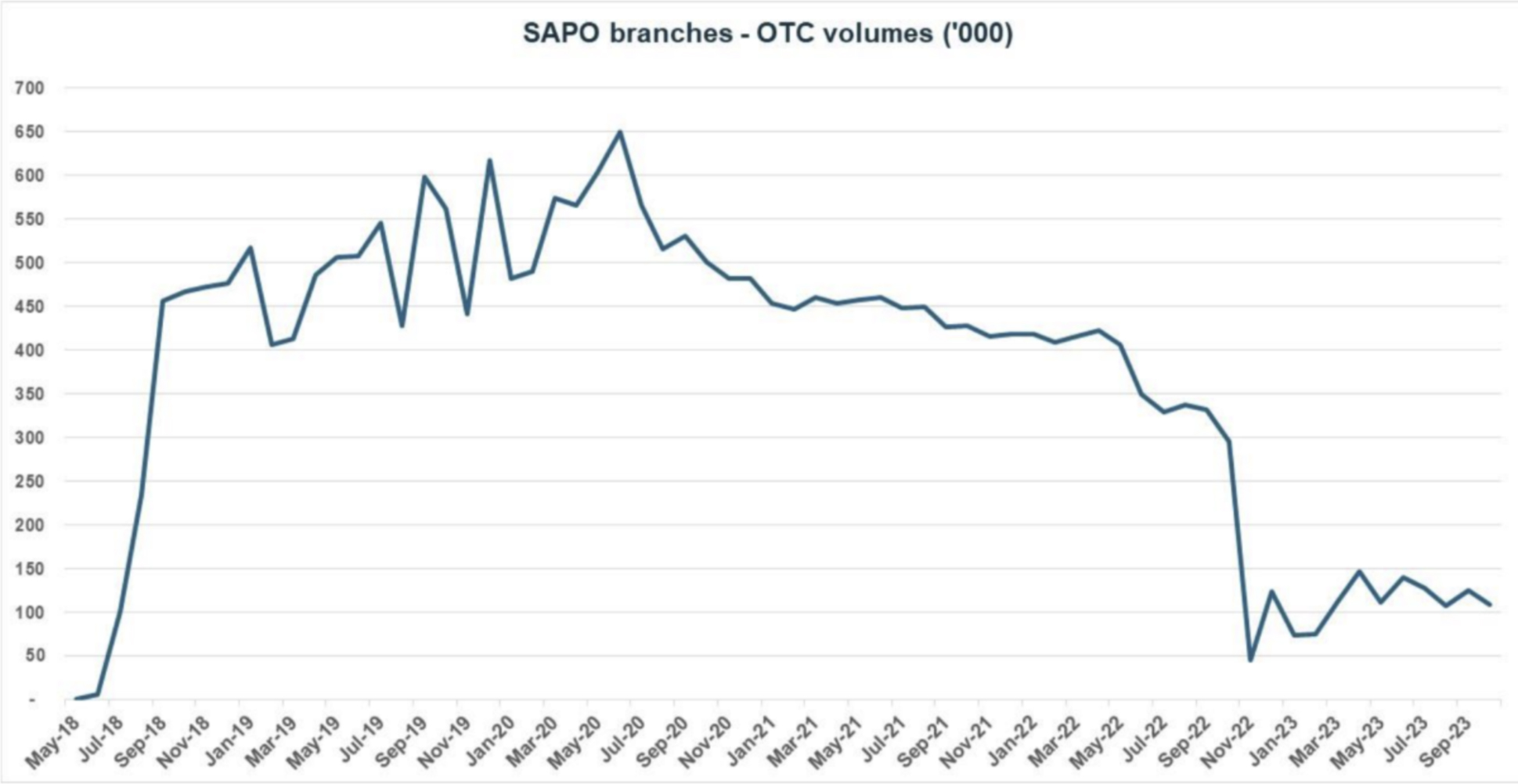A restructured SA Post Office will no longer be responsible for paying social grants to millions of beneficiaries after doing so since 2018 at a major financial loss and will cede this function to the SA Postbank.
This is one of many proposals contained in a plan to restructure the financial and operational affairs of the SA Post Office under a business rescue process — a plan yet to be approved by the creditors of the state-owned entity (SOE) and the government.
The SA Post Office has been under business rescue since July, a process that is an attempt to rehabilitate financially distressed companies by restructuring their affairs. The objective is to enable the company to continue operating while being restructured, saving some jobs in the process.
Since November 2018, social grant beneficiaries under the SA Social Security Agency (Sassa) have received their grant payments at SA Post Office branches throughout South Africa.
However, the dysfunction of SA Post Office branches, whose systems are often offline and unreliable, has meant that Sassa beneficiaries have relied more on grocery retailers and ATMs of commercial banks to withdraw their social grant payments, paying more in banking and withdrawal fees.
The SA Post Office’s function of paying social grants became a money-spinner for it in the early days of taking over the contract from Cash Paymaster Services (a subsidiary of the private sector technology player formerly known as Net1) in 2018, whose contractual arrangement with Sassa was declared invalid by the Constitutional Court.
Read more in Daily Maverick: Sassa social grants distribution doomsday and behind the scenes move to save 17-million grants
After taking over the social grant payments function from Cash Paymaster Services, the SA Post Office generated revenue of R798-million from disbursing social grants from its branches. By 2023, this revenue was reduced to R318-million because SA Post Office branches became unreliable for social grant beneficiaries — money that is forecast to further reduce to R48-million during the first six months of 2024.
Because grant beneficiaries are now withdrawing their grant payments from other channels such as retailers and ATMs of commercial banks, the money withdrawal volumes (see below) and fees earned by the SA Post Office have dropped dramatically.
 (Graph sourced from SA Post Office business rescue plan.)
(Graph sourced from SA Post Office business rescue plan.)
The Sassa over-the-counter payments are being handled by the SA Post Office at an estimated loss of more than R200-million per annum. And because of the decline, the joint business rescue practitioners of the SA Post Office, Anoosh Rooplal and Juanito Damons, have proposed that Postbank fully takes over the social grant payment function. Postbank, also a state-owned entity, was a subsidiary of the SA Post Office but has now been separated by the government from its operations to create a standalone state-owned bank.
The Sassa contract was ceded to Postbank in October 2022 with the SA Post Office still providing Sassa support services as an agent of Postbank.
“SA Post Office’s failure to maintain a safe work environment has put its employees at risk and made it more difficult to obtain affordable insurance coverage [for whatever monies are lost through theft],” the duo said.
The plan by Rooplal and Damons also involves migrating or selling certain SA Post Office branches to Postbank, which would allow Postbank to expand its banking network and accommodate the SA Post Office’s remaining Sassa grant payment clients.
“This strategic move would enable the SA Post Office to focus on its core competencies and enhance its overall financial position.
“By divesting the OTC [over-the-counter Sassa grant distribution] payment services and transferring certain branches to Postbank, SA Post Office can reduce its financial burden and focus on a more profitable business segment, improve customer satisfaction and attract new clients for its other products and services; and position itself for sustainable growth and long-term success,” the 85-page plan reads.
The recovery plan also sees the SA Post Office closing 600 branches, reducing its branch network across the country to about 600, with a dedicated sales and business development team to revitalise its mail delivery business. This team would be tasked with “attracting new clients, increasing volumes from existing clients, and implementing strategies to enhance the overall efficiency and effectiveness of SA Post Office’s bulk mail operations”.
The branches would also have a renewed focus on motor vehicle licensing services, the SA Post Office logistics depot network across SA being positioned as an attractive partner to retailers in the e-commerce space, and partnering with private sector players in the mail and parcel goods delivery industry.
However, a big part of the plan is premised on cutting costs — such as shedding 6,000 jobs at the SA Post Office — and getting a R3.8-billion bailout from the government.
Read more in Daily Maverick: Government department budgets may have to be cut to fund yet another SA Post Office bailout
The business rescue plan would grant a dividend award of 12 cents in the rand to all pre-commencement creditors, amounting to R1-billion. While this is not much, it’s better than a liquidation scenario. Were the state-owned entity to be wound up or liquidated, Rooplal and Damons said creditors would get only around 4c in the rand.
Creditors of the SA Post Office are set to vote on the business rescue plan on 7 December. DM




 Graph sourced from SA Post Office business rescue plan.
Graph sourced from SA Post Office business rescue plan.
